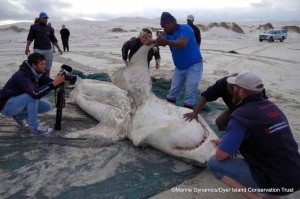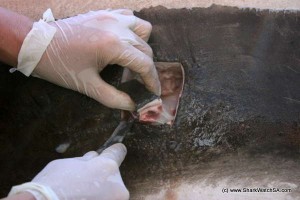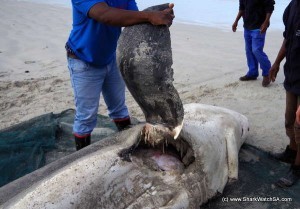As an apex predator perfectly suited to hunting down and devouring seals – and even other sharks – we tend to think of great whites as being on the top of the food chain. But recent events coming from the beaches of South Africa show that there is one marine creature that even great whites might want to avoid.
In the last week, three large great white shark carcasses have washed ashore, all with strikingly similar injuries. The remains are largely intact, but with trauma to the region between the pectoral fins, where autopsies have revealed that all three sharks have had their livers removed. Two of the carcasses were also missing their heart. The culprit: orca.
This is the first time this behavior has been seen in South African waters.
It all started at the beginning of the month, when a 4.9-meter (16-foot) female shark was found on a beach in Franskraal on the Western Cape, reports Marine Dynamics. Weighing an astonishing 1,110 kilograms (2,450 pounds), the sexually mature female was the biggest shark ever dissected in South Africa. She was found missing her liver and heart. Barely a day later, a second great white was found washed ashore, this one a 3.4-meter (11-foot) male, also missing his liver and heart. Just four days on from this, a third 4.5-meter-long (14.8-foot-long) male was found, and after dissection it too was found to be missing its liver.
“We have never seen anything like this,” explains Alison Towner, a great white shark biologist at the Dyer Island Conservation Trust, who helped carry out the dissections. “It seems likely that orcas are again the cause of death but we will confirm after the autopsy. Obviously this is a very sad time for us all, nature can be so cruel and the dexterity these enormous animals are capable of is mind blowing, almost surgical precision as they remove the squalene rich liver of the white sharks and dump their carcass.”
It seems that the top predator in the region is itself being hunted by orca, who have perfected a way to kill the sharks and then remove their liver and heart. It may seem odd that the cetaceans are not feasting on the entire carcass – after all, it can’t be an easy job taking out a 4.9-meter great white shark – but it is not an unusual behavior. When hunting whales, for example, orca will frequently kill calves and then only eat the tongue, before abandoning the carcass.
Interestingly, this bizarre spate of killings by orca is matched by the fact that tour operators in the last few weeks have been struggling to find any great whites in the region.
What may have caused this shift in unusual behavior is not known. Perhaps orca and whale numbers have recovered and natural interactions are now occurring, or maybe something else has altered the orca behavior, such the diminishing of its usual prey.
Ask me anything
Explore related questions








